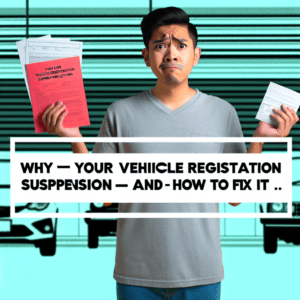Here’s your professionally formatted, modern-looking post:
Why Your Vehicle Registration Might Be Suspended – And How to Fix It
Introduction
Keeping your vehicle registration active is essential for legally driving and ensuring your car meets safety and environmental standards. If your registration gets suspended, you could face fines, penalties, or even vehicle impoundment—causing major inconveniences in your daily life.
In this guide, we’ll explore the common reasons for registration suspensions and provide practical steps to fix them quickly.
Common Reasons for Vehicle Registration Suspension
1. Unpaid Traffic Tickets or Fines
Ignoring or delaying payment of traffic fines can lead to registration suspension. Many states require all outstanding tickets to be paid before renewing your registration. Late fees can accumulate, making the problem worse—so pay your tickets on time to avoid complications.
2. Lapse in Auto Insurance
Most states require continuous insurance coverage. If your policy lapses, even briefly, your registration may be suspended. Having valid auto insurance is not only a legal requirement but also crucial for protecting yourself and others on the road.
3. Emissions Test Failures or Non-Compliance
Emissions tests help ensure your vehicle meets environmental regulations. If your car fails an emissions test or you fail to complete the required inspection, your registration renewal may be denied. Stay informed about testing schedules to remain compliant.
4. Failure to Pay Vehicle-Related Taxes
Vehicle taxes, such as property tax or vehicle license fees, are often tied to registration. Non-payment can result in a hold or suspension. Paying these taxes on time helps keep your registration active without issues.
5. Incorrect or Outdated Vehicle Information
Errors in your registration details, such as a wrong address, expired documentation, or an incorrect VIN (Vehicle Identification Number), can lead to suspension. Keeping your information updated with the DMV prevents unnecessary complications.
How to Check If Your Vehicle Registration Is Suspended
To avoid unexpected issues, check your registration status through:
✅ Online DMV portals – Most DMVs offer an online service where you can verify your registration status.
✅ Official DMV notifications – If your registration is suspended, you’ll typically receive a notice by mail.
✅ In-person DMV visits – You can also confirm your status by visiting a DMV office.
Regularly checking your registration status helps you address potential problems early.
Steps to Reinstate a Suspended Vehicle Registration
1. Resolving Unpaid Fines
If unpaid fines caused the suspension, pay them immediately. Some states offer payment plans, but be aware that late fees or penalties may apply.
2. Restoring Insurance Coverage
To reinstate your registration, you must provide proof of valid auto insurance. Choose a reliable insurance provider and ensure your policy remains active to avoid future suspensions.
3. Addressing Emissions Test Issues
If an emissions test failure caused the suspension:
🔧 Get necessary repairs – Work with a certified mechanic to fix emissions-related problems.
📆 Schedule a retest – Once repairs are done, take another emissions test to meet state requirements.
✔ Submit proof of compliance – Provide updated emissions test results to the DMV.
4. Paying Outstanding Taxes
If your suspension is due to unpaid taxes, make full payments as soon as possible. Many states offer payment plans or financial assistance programs if needed.
5. Correcting Vehicle Information
Ensure your registration details are accurate by updating:
📍 Address & Contact Info – If you moved, update your records to avoid missing important DMV notices.
🚗 VIN & Vehicle Records – Double-check that all vehicle-related details are correct.
📄 Ownership Documents – If there are discrepancies, submit proper proof of ownership.
Preventing Future Registration Suspensions
✅ Maintain Active Auto Insurance – Regularly check your policy status and renew on time.
✅ Stay on Top of Tickets & Fines – Pay any traffic violations promptly to prevent escalation.
✅ Monitor Emissions Test Deadlines – Set reminders for required inspections and compliance tests.
✅ Pay Taxes on Time – Keep records of due dates to avoid tax-related registration holds.
✅ Update DMV Records Regularly – Ensure your registration details stay current to avoid administrative issues.
Conclusion
Keeping your vehicle registration in good standing is essential for hassle-free driving. By understanding state requirements and taking proactive steps, you can avoid costly suspensions and legal troubles.
If you’re facing registration issues, Tags Clinic can help simplify the process. Our expert services make it easier to renew, reinstate, or update your registration efficiently.
Need Help? Contact Tags Clinic Today!
💻 Visit Our Website
📞 Call Us for Assistance
Let Tags Clinic handle your registration and titling needs—so you can stay on the road without stress! 🚗✅




